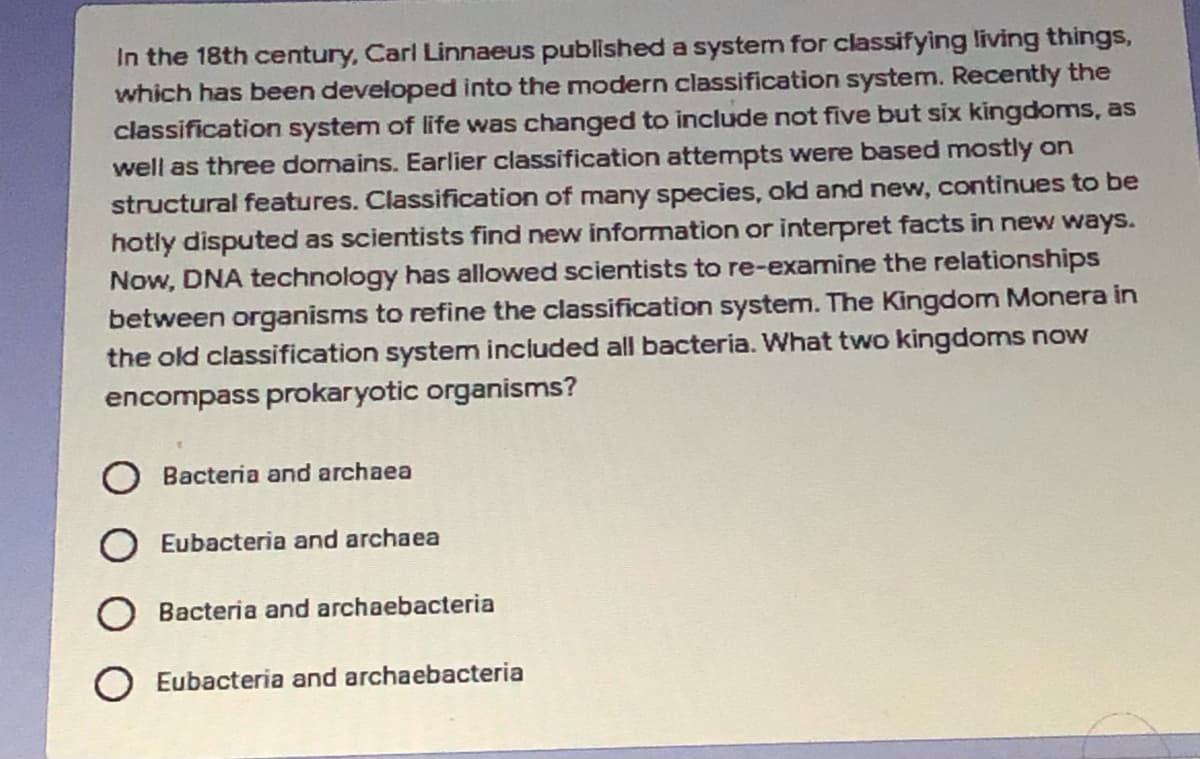In the 18th century, Carl Linnaeus published a system for classifying living things, which has been developed into the modern classification system. Recently the classification system of life was changed to include not five but six kingdoms, as well as three domains. Earlier classification attempts were based mostly on structural features. Classification of many species, old and new, continues to be hotly disputed as scientists find new information or interpret facts in new ways. Now, DNA technology has allowed scientists to re-examine the relationships between organisms to refine the classification system. The Kingdom Monera in the old classification system included all bacteria. What two kingdoms now encompass prokaryotic organisms?
In the 18th century, Carl Linnaeus published a system for classifying living things, which has been developed into the modern classification system. Recently the classification system of life was changed to include not five but six kingdoms, as well as three domains. Earlier classification attempts were based mostly on structural features. Classification of many species, old and new, continues to be hotly disputed as scientists find new information or interpret facts in new ways. Now, DNA technology has allowed scientists to re-examine the relationships between organisms to refine the classification system. The Kingdom Monera in the old classification system included all bacteria. What two kingdoms now encompass prokaryotic organisms?
Human Biology (MindTap Course List)
11th Edition
ISBN:9781305112100
Author:Cecie Starr, Beverly McMillan
Publisher:Cecie Starr, Beverly McMillan
Chapter23: Principles Of Evolution
Section: Chapter Questions
Problem 5SQ
Related questions
Question

Transcribed Image Text:In the 18th century, Carl Linnaeus published a system for classifying living things,
which has been developed into the modern classification system. Recently the
classification system of life was changed to include not five but six kingdoms, as
well as three domains. Earlier classification attempts were based mostly on
structural features. Classification of many species, old and new, continues to be
hotly disputed as scientists find new information or interpret facts in new ways.
Now, DNA technology has allowed scientists to re-examine the relationships
between organisms to refine the classification system. The Kingdom Monera in
the old classification system included all bacteria. What two kingdoms now
encompass prokaryotic organisms?
Bacteria and archaea
Eubacteria and archaea
Bacteria and archaebacteria
Eubacteria and archaebacteria
Expert Solution
This question has been solved!
Explore an expertly crafted, step-by-step solution for a thorough understanding of key concepts.
This is a popular solution!
Trending now
This is a popular solution!
Step by step
Solved in 2 steps

Knowledge Booster
Learn more about
Need a deep-dive on the concept behind this application? Look no further. Learn more about this topic, biology and related others by exploring similar questions and additional content below.Recommended textbooks for you

Human Biology (MindTap Course List)
Biology
ISBN:
9781305112100
Author:
Cecie Starr, Beverly McMillan
Publisher:
Cengage Learning

Biology Today and Tomorrow without Physiology (Mi…
Biology
ISBN:
9781305117396
Author:
Cecie Starr, Christine Evers, Lisa Starr
Publisher:
Cengage Learning

Biology: The Unity and Diversity of Life (MindTap…
Biology
ISBN:
9781305073951
Author:
Cecie Starr, Ralph Taggart, Christine Evers, Lisa Starr
Publisher:
Cengage Learning

Human Biology (MindTap Course List)
Biology
ISBN:
9781305112100
Author:
Cecie Starr, Beverly McMillan
Publisher:
Cengage Learning

Biology Today and Tomorrow without Physiology (Mi…
Biology
ISBN:
9781305117396
Author:
Cecie Starr, Christine Evers, Lisa Starr
Publisher:
Cengage Learning

Biology: The Unity and Diversity of Life (MindTap…
Biology
ISBN:
9781305073951
Author:
Cecie Starr, Ralph Taggart, Christine Evers, Lisa Starr
Publisher:
Cengage Learning

Biology: The Dynamic Science (MindTap Course List)
Biology
ISBN:
9781305389892
Author:
Peter J. Russell, Paul E. Hertz, Beverly McMillan
Publisher:
Cengage Learning

Concepts of Biology
Biology
ISBN:
9781938168116
Author:
Samantha Fowler, Rebecca Roush, James Wise
Publisher:
OpenStax College